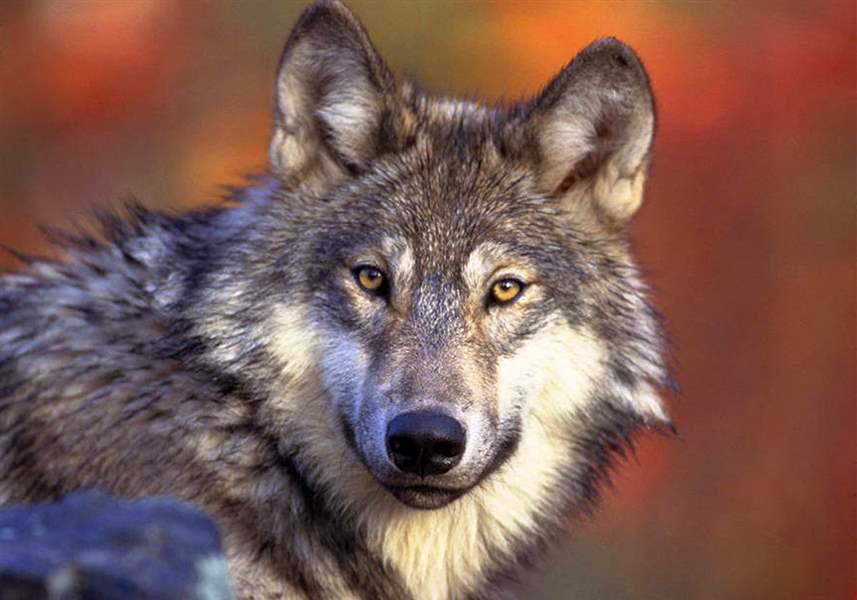
Rare hunt opens amid controversy
Michigan’s season to harvest gray wolf is first in half-century
11/15/2013
The gray wolf was nearly extinct in Michigan by 1960 and repopulated after being put on protected lists. Those safeguards have been removed.
U.S. FISH AND WILDLIFE SERVICE

The gray wolf was nearly extinct in Michigan by 1960 and repopulated after being put on protected lists. Those safeguards have been removed.
BARAGA, Mich. — The current generation of Michigan hunters has successfully harvested white-tailed deer, elk, bear, and a wide range of small game, including the crafty coyote.
But today, for the first time in more than half a century, hunters will be matching wits with Canis lupus — the gray wolf — and they will likely find it to be a very challenging quarry.
Wolves, the largest member of the Canid family that includes dogs, foxes, coyotes, and jackals, are accustomed to being the hunter, not the hunted.
The wildlife biologists who know these reclusive predators well expect the human hunters taking part in Michigan’s first structured wolf hunting season in the Upper Peninsula to experience minimal success.
Brian Roell, a wolf specialist with the Michigan Department of Natural Resources who works out of the Marquette office, said that based on recent wolf hunts in Minnesota and Wisconsin, he would expect only about 4 percent of Michigan’s wolf-hunting permit holders to bring back a wolf this season. It will likely be that difficult.
“If we had any other game species, or deer hunting, or rabbit hunting, or squirrel hunting, where you’d have 4 percent success rates, the hunters would be quite upset with us,” Mr. Roell said. “I think some folks are probably overestimating their ability to harvest a wolf.”
Since today’s start of the wolf hunting season coincides with the opening of Michigan’s firearms season for deer, Mr. Roell said he believes many of the 1,200 wolf permits sold were purchased by white-tailed deer hunters who plan to hunt in the Upper Peninsula, and stalking wolves will not be their primary interest.
“I think a lot of these are going to be opportunistic hunters,” Mr. Roell said. “They are up here deer hunting anyway in the Upper Peninsula.”

The wolf hunting season that began a half-hour before sunrise is taking place in just three small sections of the Upper Peninsula — areas where biologists say there have been the most incidents involving wolves preying on livestock or dogs.
The MDNR said there were 136 verified attacks by wolves on livestock and dogs over the last three years, and hundreds more over the last decade or so as the wolf population in the Upper Peninsula expanded. There were only around 20 wolves in the Upper Peninsula two decades ago, but the population is now around 660.
Wildlife officials say the hunt is intended to provide some relief in the hardest-hit areas, but the total quota for the hunt — 43 animals — will not significantly affect the overall wolf population in the Upper Peninsula. There are not believed to be any wolves established in the Lower Peninsula.
Adam Bump, the bear and furbearer specialist with the MDNR, said Michigan is trying a “novel” approach for the management of wolves by keeping the hunts localized and focused on the places where wolf depredation cases have been the highest.
“The hunt is not about managing the number of wolves that are out there, but trying to reduce conflicts,” Mr. Bump said. “We don’t have set population goals — we’re trying to reduce conflicts.”
He said that although Michigan has not yet experienced an attack on humans by wolves, there have been cases where wolves have exhibited behavior that indicates they might have lost their fear of humans. He said the MDNR wants to take some kind of action before an attack on humans takes place.
Officials with MDNR hope to depress local populations of wolves in the troublesome areas, and at the same time change the wolves’ behavior. “We’re trying to look at being very conservative, but having some impact on those local populations,” Mr. Bump said.
The forces that have marshaled against the hunt, which include the Humane Society of the United States, gathered enough signatures to get the issue on the ballot next year, when Michigan voters will decide if the state should continue to classify wolves as a game species.
Nancy Warren, whose home is in wolf country just south of Baraga, is the regional director of the National Wolfwatcher Coalition. Ms. Warren said the wolf hunt lacks a “sound, scientific basis,” but instead has been pushed by special interest groups.
Wolves, which are native to Michigan, were all but wiped out in the Upper Peninsula by around 1960, when a state-backed bounty on the animals was ended. The state made them a protected species in 1965, and in 1973 the Endangered Species Act afforded Michigan’s few remaining wolves further safeguards.
A natural movement of wolves from Wisconsin, Minnesota, and Ontario eventually repopulated the Upper Peninsula, and in 2012, the U.S. Fish and Wildlife Service removed protection from wolves in the Great Lakes region.
Michigan is one of eight states where wolf hunting takes place, joining Alaska, Montana, Idaho, Wyoming, Washington, Wisconsin, and Minnesota. The neighboring province of Ontario also allows wolf hunting.
The 2013 Michigan wolf season will run until Dec. 31, or until the harvest target for each of the three management units is met. The bag limit is one wolf per person per year.
Contact Blade outdoors editor Matt Markey at: mmarkey@theblade.com or 419-724-6068.